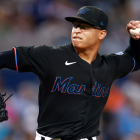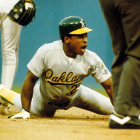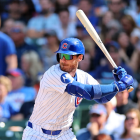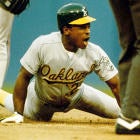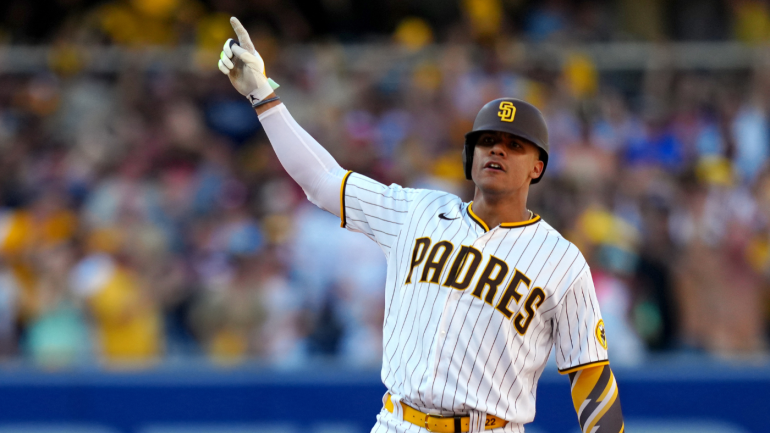
Friday occasions the arbitration deadline in Major League Baseball, which means it's the final day for teams and their arbitration-eligible players to exchange salary figures for the upcoming season.
By way of reminder, players with between three and six years of big-league service time* have their salaries determined or at least informed by salary arbitration. Typically, arbitration salaries come out of negotiations between team and arb-eligible player, but if an agreement can't be reached then each side submits its salary figure to an arbitration panel. The panel then picks one figure or the other -- there's no averaging the two submitted figures or otherwise pulling a salary out of thin air for the player. This dynamic encourages serious negotiation, and it explains why you don't see truly absurd figure exchanges by player or team (if either side submitted a preposterous salary figure, then the panel would swiftly choose the opposing figure).
As for that asterisk (*) above, a small group of players known as "super twos" are eligible for an extra year of salary arbitration after just two years of MLB service. Generally, though, players see big salary growth in years three, four, and five of their careers heading into free agency after six years of service time. That's thanks to arbitration. By way of prominent example, Angels two-way superstar Shohei Ohtani back in October avoided the process by agreeing to a one-year, $30 million pact for his upcoming walk year. Not surprisingly, that's a record salary for an arb-eligible player.
Most arb-eligible players will agree to salaries for the upcoming season prior to the deadline, and others will agree to terms before an arbitration hearing is set to go down. A smaller number won't reach an accord with their teams and will indeed participate in a hearing, but those hearings can become contentious and awkward -- it in essence asks teams to diminish the accomplishments of the player in question -- and both sides typically prefer to avoid that final step. That "typically" qualifier is important, as some clubs take a "file and trial" approach, in which they refuse to negotiate further if deadline day doesn't yield an agreement.
Also of note is that for some prominent arb-eligible players, long-term extensions can grow out of these talks. That is, negotiations with arb-eligible players don't have to yield a one-year pact. Sometimes they can even lead to nine-figure pacts that "buy out" the players' remaining arb years and one or more free-agent seasons.
Below we'll track the prominent signings on deadline day, led off by one that went down well prior to Friday's finish line.
Devers, Red Sox agree to big extension
The Red Sox earlier this month halted a trend of hemorrhaging homegrown stars by signing third baseman Rafael Devers to an 11-year, $331 million extension. Devers had been third-year arbitration-eligible and slated for free agency following the 2023 season. Instead, he'll be in a Boston uniform for years to come.
Devers, 26, hit .295/.358/.521 (141 OPS+) with 42 doubles, 27 homers, and a 4.4 WAR last season and made his second straight All-Star team. He's already amassed nearly 3,000 plate appearances in 689 career regular-season games since debuting at just 20 years old and slashed .283/.342/.512 (124 OPS+) over that span. He led the AL with 54 doubles in 2019 and he has two 30-plus homer, 100-plus RBI seasons to his credit.
Soto, Padres strike deal for 2023
The Padres and star slugger Juan Soto have agreed to a $23 million contract for 2023, ESPN reports. Soto was the prize of last season's trade deadline, and in 153 combined games for the Padres and Nationals he tallied 27 home runs and an MLB-leading 135 walks. For his career, the 24-year-old has a sky-scraping OPS+ of 157. Soto is slated for free agency after the 2024 season, which means one more year of arbitration eligibility. The big question remains whether the Padres will be able to sign him to a (likely record-breaking) long-term extension before he reaches free agency. What we do know is that no long-term deal came out of Friday's deadline.
Hader sets record for relievers
Closer Josh Hader and the Padres agreed to a $14 million deal for his walk year of 2023, Robert Murray reports. That's an arbitration record salary for a reliever.
Hader struggled with the Brewers last season and overall fared even worse after the trade to San Diego. However, beginning in September and carrying through the Padres' NLCS run, Hader seemed to find his level -- a level that has seen him save 132 games, pitch to a 156 ERA+ for his career, strike out 563 batters in 332 1/3 innings, and make four All-Star teams. No doubt, Hader and the Padres are hoping for more of that peak in his age-29 season.
Alonso, Guerrero set records for first basemen
Sluggers Pete Alonso and Vladimir Guerrero Jr. set new salary records for arbitration-eligible first baseman at their service time level this offseason. Here are the records:
- One year from free agency: José Abreu, $16 million with White Sox in 2019
- Two years from free agency: Pete Alonso, $14.5 million with Mets in 2023 (per ESPN)
- Three years from free agency: Vladimir Guerrero Jr., $14.5 million with Blue Jays in 2023 (per Sportsnet)
Barring catastrophic injury or an unexpected collapse in performance, Vlad Jr. will break Alonso's and Abreu's salary records at those service time levels in the coming years.
Home runs are the easiest way to get paid through arbitration and no player has hit more than Alonso's 146 since his MLB debut in 2019. He also has two All-Star Game selections and a Rookie of the Year award, which further boost his arbitration case. Guerrero is quite proficient in the power department himself, plus he has two All-Star Game selections, a Gold Glove, and an MVP runner-up to strengthen his case.
Other notables
Here are some notable players who reportedly agreed to standard one-year deals to avoid arbitration Friday:
- Chris Paddack, Twins (three-year, $12.5 million extension)
- Julio Urías, Dodgers ($14.25 million)
- Rhys Hoskins, Phillies ($12 million)
- Brandon Woodruff, Brewers ($10.8 million)
- Lucas Giolito, White Sox ($10.4 million)
- Shane Bieber, Guardians ($10.01 million)
- Jordan Montgomery, Cardinals ($10 million)
- Walker Buehler, Dodgers ($8.025 million)
- Framber Valdez, Astros ($6.8 million)
- Dylan Cease, White Sox ($5.7 million)
- Zac Gallen, Diamondbacks ($5.6 million)
- Jack Flaherty, Cardinals ($5.4 million)
- Tyler O'Neill, Cardinals ($4.95 million)
- Rowdy Tellez, Brewers ($4.95 million)
- Logan Webb, Giants ($4.6 million)
- Cedric Mullins, Orioles ($4.1 million)
- Gregory Soto, Phillies ($3.925 million)
- Dustin May, Dodgers ($1.675 million)
No deal by deadline
According to MLB.com, 33 players were unable to come to terms with their respective teams prior to Friday's deadline. That means negotiations may continue or be shut down in advance of a hearing. Here are a few of the most notable names:
- Luis Arraez at $6.1 million, Twins at $5 million
- Bo Bichette at $7.5 million, Blue Jays at $5 million
- Corbin Burnes at $10.75 million, Brewers at $10.01 million
- Yandy Díaz at $6.3 million, Rays at $5.55 million
- Seranthony Domínguez at $2.9 million, Phillies at $2.1 million
- Max Fried at $15 million, Braves at $13.5 million
- Ryan Helsley at $3 million, Cardinals at $2.15 million
- Teoscar Hernández $16 million, Mariners at $14 million
- Jeff McNeil at $7.75 million, Mets at $6.25 million
- Gleyber Torres at $10.2 million, Yankees at $9.7 million
- Kyle Tucker at $7.5 million, Astros at $5 million
















